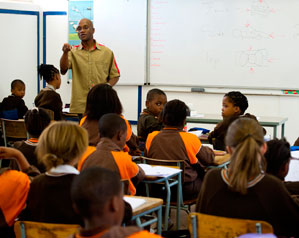Education and skills development
 Central to efforts to end poverty and to develop the economy is to provide decent, quality education to every young South African. Government is immensely proud of the achievements of the Matric Class of 2024, which achieved the highest pass rate in the country’s history.
Central to efforts to end poverty and to develop the economy is to provide decent, quality education to every young South African. Government is immensely proud of the achievements of the Matric Class of 2024, which achieved the highest pass rate in the country’s history.
Eighty-seven percent of learners who sat for their matric exams passed. For the first time in the history of the country, nearly half of these learners achieved a Bachelors pass.
“Nothing can diminish our pride in the hard work of these learners and the steady support of their teachers, parents and broader community. Our immediate focus is to expand access to early childhood development (ECD) for every child. This will be achieved through registering and formalising existing ECD centres and ensuring that they have the facilities, training and material that they need to provide quality early learning.” – President Cyril Ramaphosa, SoNA, 6 February 2025, Cape Town City Hall.
Government will focus on ensuring that every child can read for meaning in the Foundation Phase to set them up for success in later years. To achieve this, it is implementing mother tonguebased bilingual education to improve literacy and numeracy outcomes and rolling out lesson plans, reading books and other interventions that have been proven to work.
The Funza Lushaka Bursary Scheme will continue to prioritise students who want to pursue a teaching career in the Foundation Phase. Last year, government signed the Basic Education Laws Amendment Act, 2024 (Act 32 of 2024) which is pivotal for ensuring that education is accessible and inclusive for all South Africans.
This year, the Minister of Basic Education will introduce national policy, norms and standards and regulations to empower all partners in basic education to support implementation of the Act.
To ensure that the economy has the skills it needs, government is increasing the production of artisans through Technical and Vocational Education and Training colleges. This is part of the shift we are undertaking towards education and skills development that combines formal learning with job training.
Drawing on the models that have proved so successful in other countries, we call on the private sector to offer young people experiential learning opportunities while they undertake their studies.
We are implementing Phase 1 of the Comprehensive Student Funding Model for Higher Education to address the needs of the “missing middle”. This will support approximately 10 000 students in the first year.




